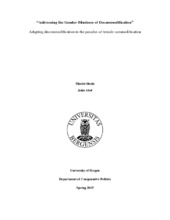"Addressing the Gender Blindness of Decommodification" - Adapting decommodification of the paradox of female commodification
Master thesis
Permanent lenke
https://hdl.handle.net/1956/10912Utgivelsesdato
2015-06-01Metadata
Vis full innførselSamlinger
Sammendrag
This thesis seeks to resolve the gender blindness of Esping-Andersen's decommodification index and examine which socioeconomic and political forces that explain decommodification when female decommodification is accounted for. To answer these questions a multiple regression analysis is utilized with the same eighteen OECD countries as used by Esping-Andersen, but with a time series of 1971-2002. Documented research on welfare policies and the decommodification of women has been plagued by a limited time perspective and theory generating work using descriptive statistics. Critique of the decommodification index can be divided into four main categories: limited regime typology with only three welfare regime types, operational validity, replicability and its gender blindness. By gender blindness they mean the index's lack of perspective when it comes to female decommodification. In this thesis the latter three problems are addressed. The field of comparative welfare state research has a long tradition of trying to understand what explains welfare regimes' development. The problem, before Esping-Andersen's work and to a lesser degree after, has been that contrasting conclusions have been drawn on what explains it based on data operationalization and methods used. There is however a strong consensus on the positive effect from left leaning political parties on decommodification and this still holds true for my findings. The central new findings of this thesis is that family welfare policies are the most effective policy tools for keeping women employed. The paradox is that by increasing the proportion of active female labor they also qualify for higher levels of decommodification in the form of replacement rates. My improved decommodification index incorporates these policies and by doing so alleviate the critique of gender blindness. Furthermore what explain decommodification, and especially family welfare policies, are female politicians independent of party loyalties. Implicating that female politicians are the prime example of practicing political self-interests.
